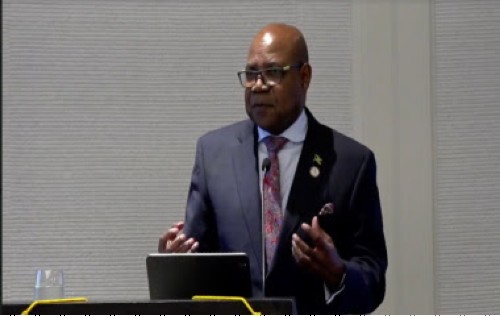KINGSTON, Jamaica – Jamaica has renewed its call for the establishment of a global resilience fund to aid in boosting tourism, saying the initiative would encourage tourists to take personal responsibility for bolstering the ability to respond, mitigate, adapt, and recover from the impacts of climate-related shocks.
 Tourism Minister Ed Bartlett“Imagine if each tourist were to contribute a small tip after every purchase made in their destination. This simple act could potentially generate billions of dollars, crucially needed by nations that are exceptionally vulnerable to climate change but often lack the necessary resources to enhance their resilience,” Tourism Minister Edmund Bartlett told the joint fifth Urban Economy Forum and 59th ISOCARP World Planning Congress.
Tourism Minister Ed Bartlett“Imagine if each tourist were to contribute a small tip after every purchase made in their destination. This simple act could potentially generate billions of dollars, crucially needed by nations that are exceptionally vulnerable to climate change but often lack the necessary resources to enhance their resilience,” Tourism Minister Edmund Bartlett told the joint fifth Urban Economy Forum and 59th ISOCARP World Planning Congress.
He told the three-day event that ended here on Thursday of the unique challenges faced by small island developing states (SIDS), citing factors such as their small size, limited resources, geographical isolation, and heightened susceptibility to climate change.
He said these vulnerabilities manifest as threats like natural disasters, economic fragility, food security concerns, energy dependencies, health vulnerabilities, and biodiversity loss.
“Effectively addressing these vulnerabilities demands a multifaceted approach, including international cooperation, climate resilience initiatives, sustainable development strategies, and rigorous efforts to reduce greenhouse gas emissions,” Bartlett told delegates to the conference organized by the International Society of City and Regional Planners (ISOCARP) and held under the theme, “For Climate Action, Urban Finance: Climate-responsive Planning for Equitable Places and Communities.”
Bartlett said that it was important for SIDS including Jamaica, to receive international support in their efforts to build resilience and pursue sustainable development in the face of these extraordinary challenges.
He acknowledged the significant role of tourism in global carbon emissions, contributing approximately eight per cent of global CO2 emissions and poised to double by 2035.
Bartlett said there was the urgent need for a more sustainable model in the industry, reiterating Jamaica’s “unwavering commitment” to sustainable tourism.
He highlighted the country’s climate-responsive policies and initiatives, including the Master Plan for Sustainable Tourism Development, the Destination Assurance Framework and Strategy (DAFS), the Blue Ocean Strategic Framework, the Community Tourism Policy, and the Tourism Linkages Networks Policy.
Bartlett said that alongside government initiatives, individual responsibility is a pivotal component of the equation.
“Personal responsibility entails supporting policies and initiatives that promote sustainability and equity, and actively engaging with our local governments to hold them accountable for their commitments to climate action and urban development.
“It also means educating ourselves and others about the importance of climate-responsive planning and sustainable financing,” he added, “so that we can make informed decisions and advocate for change,” he added.


